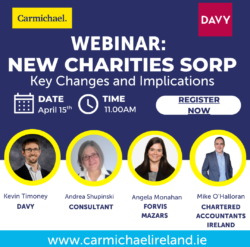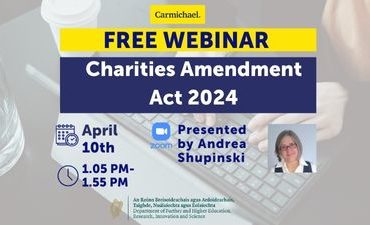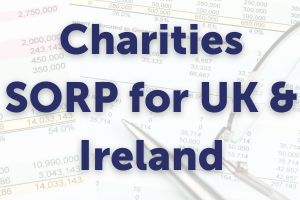The Compliance Calendar is a useful addition to the board materials for a meeting to ensure that relevant actions are addressed by the Board. It can also assist with preparing the agenda for an upcoming meeting. This Sample Compliance Calendar should be amended/tailored to reflect the specific compliance requirements of your own charity or non-profit.
Carmichael wishes to acknowledge the support of Colm Hanley, LK Shields Solicitors in the development of this resource.
Questioning what training and support is needed in the Voluntary and Community Sector, extensive qualitative research was carried out by Carmichael and The Wheel. Here, this report contains the results of this research carried out with organisations representing the full diversity of our sector as well as policymakers, regulators and funders. We hope that the information in the report will assist not just Carmichael and The Wheel, but all infrastructure organisations in designing the supports and training that they will offer in the future.
Applying for Charitable Status can seem daunting but it can also be a very rewarding process which can help you to improve the governance of your organisation.
There are plenty of great resources out there to help you find your way. We have put together a practical step-by-step guide with links to some relevant resources to help you with your application.
In the Good Governance Awards, each of the annual reports go through a very rigorous assessment but underpinning the many assessments and checklists are some key elements that are essential in the eyes of the assessors and judges. In the spirit of improving standards, we have compiled a summary of the top ten judges’ recommendations arising from their assessment of this year’s shortlisted annual reports. We have also included the top ten comments from our assessors in relation to annual reports that were not shortlisted.
This guidance document has been developed by Carmichael to help charities that are implementing the Charities Governance Code by matching the standards in the Code against resources that are available to help with implementation.
Making A Merger Happen – The core components and key steps in a merger process
This article is a follow on article to the article that discussed the need to do a rigorous evaluation of the merger prospect before engaging in a formal process. In this article, we discuss the core elements and steps to be taken when you are engaged in a formal merger process.
The management of management and the development and adherence to good governance principles is a collective responsibility of the Board, the CEO and the Management team.
Before you do a Merger Process have a read at this article to make you are ready for it. It is of vital importance that before you formally engage in merger discussions, that the board and management go through the following evaluation checklist.
A short article highlighting the seven signs that show your Board is in need of a spring clean.
In developing this free handbook, Carmichael sought to reflect the principles and standards of the Charities Governance Code but it can be used by any non-profit organisation. This handbook is a template and it should be amended/tailored to reflect your own charity or other non-profit.




